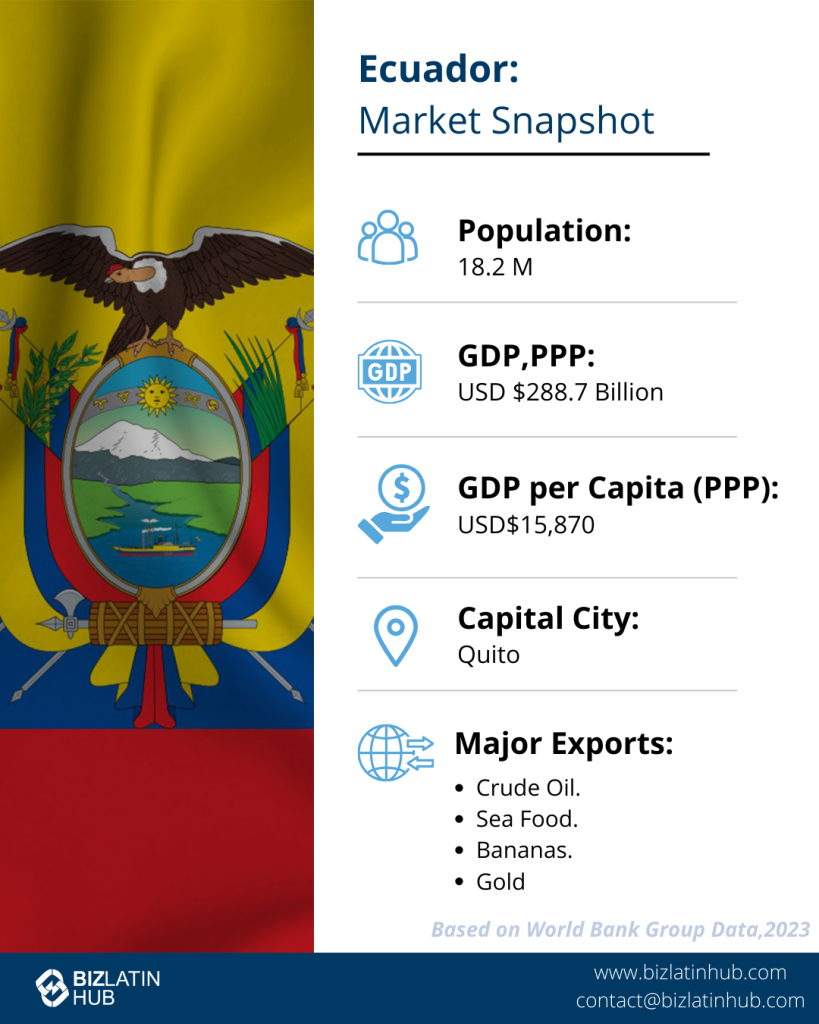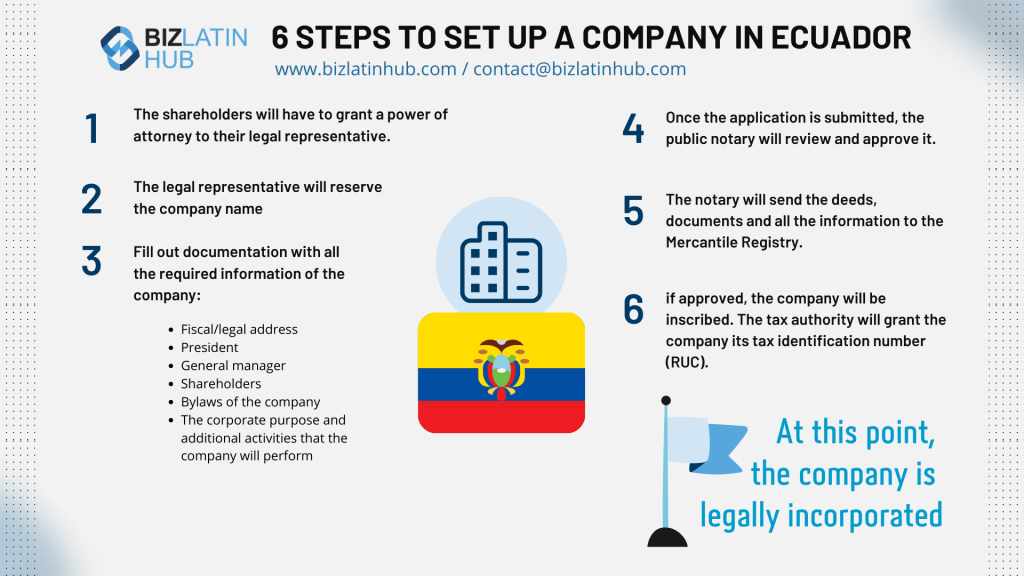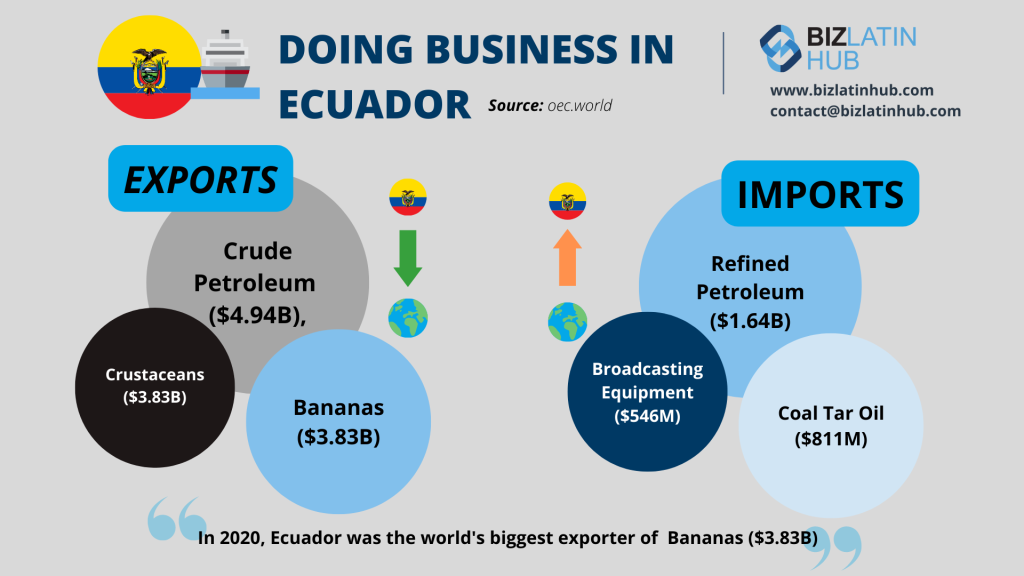As businesses across Latin America and indeed around the world look for new opportunities, expanding into new markets is often considered one of the best options for growth and long-term profitability. That’s why a growing number of businesspeople are looking at company formation in Ecuador. The country is undergoing a transitional period right now and it’s a good time to start here. Below, we offer a summary for doing business in Ecuador, share its most profitable and valuable industries, and discuss the future of the country’s economy.
Key takeaways on doing business in Ecuador
| Is foreign ownership allowed in Ecuador? | Ecuador allows 100% foreign ownership and has no monetary controls on the movement of capital |
| Most important sectors in Ecuador | Agriculture remains an important part of its economy today, generating an estimated USD$1.8 billion annually, but foreign investment and diversification have encouraged new businesses. The development of new technologies and the ongoing push to combine innovation with sustainability has brought about opportunities in oil. |
| Are there Free Trade Zones in Ecuador? | Special Economic Zones can be utilized for growth in the country and allow businesses exemption from corporate taxation and tariffs when importing/exporting. |
| Are there incentives for Foreign Direct Investment in Ecuador? | A new law, known as The Productive Promotion and Attraction of Foreign Investment Law, offers income tax and profit relief to foreign investors in certain sectors. |
| What international links does the country have? | Ecuador is is a member of the Community of Andean Nations. There are free trade agreements with EFTA, Mercosur and China, among others |
Doing Business in Ecuador’s economy
With a GDP (PPP) of nearly USD$300 billion and positive economic growth ranging from 0.1% to 5% over the past five years, Ecuador is a country on the up. Thanks to low unemployment in the country (latest figures put Ecuador’s unemployment figure at 5.4%), the country boasts an increasing middle-class citizenship, with many of its citizens having high levels of disposable income, meaning that there is a market for luxury goods and services.
Annually, the country exports more than USD$19 billion worth of goods and services to other countries around the world, and imports a similar amount to appease rising consumer demand and growing foreign direct investment. The country has a number of Free Trade Zones and also is a member of the Community of Andean Nations. There are free trade agreements with EFTA, Mercosur and China, among others.
Whilst, on the whole, the country’s figures look good, it’s expected that its economy will slow down in coming years, as the government cuts public spending in a bid to strengthen its finances. Public debt in the country has increased to 45.2% of its GDP. With austerity on the rise, consumption and demand for goods and services may also suffer as inflation levels rise and the country’s dollarized economy struggles with its reliance on external funding.
Major industries with opportunities for doing business in Ecuador

For much of the 20th century, Ecuador’s economy was powered by its agricultural products, with the country becoming a renowned producer of commodities such as coffee, cocoa, rice, potatoes, sugarcane, pork, beef, bananas, dairy, fish, and shrimp. Whilst agriculture and its processed foods industries remain an important part of its economy today, generating an estimated $USD1.8 billion annually, foreign investment and diversification have encouraged new businesses across a range of industries to take dominance, adding to the country’s GDP.
The development of new technologies and the ongoing push to combine innovation with sustainability has brought about opportunities in oil, which currently accounts for around 50% of the country’s exported goods. With large natural petroleum reserves, Ecuadorian firms are able to extract around 500,000 barrels of oil a day, of which 90% is exported to foreign countries. According to the latest data, the country has around six and a half billion barrels of oil in reserve, meaning countless opportunities for other businesses to exploit its reserves.
The service sector is another key area of growth in the country and is considered Ecuador’s biggest single sector, contributing 56.14% of the GDP. Industry follows in second place, contributing 33.43% to the GDP. Manufacturing comes in third with a 16.33% share.
Incorporation process
Forming a company in Ecuador is a relatively straightforward process, particularly when you work with a local business expert. Below, we round up the Ecuadorian company incorporation basics:
- A business can be registered with two shareholders.
- Directors and shareholders can be of any nationality.
- Companies incorporated in Ecuador can be 100% foreign owned.
- Directors do not need to travel to Ecuador to incorporate their businesses.
- Just USD$400 share capital is required to get started in the country.
- Typically, it takes between 6 to 8 weeks to complete the company incorporation process.
- The most common company type is the SRL (Sociedad de responsabilidad Limitada).
- No physical office is required to incorporate or operate in the country.

Key information for investors doing business in Ecuador
- A new law, known as The Productive Promotion and Attraction of Foreign Investment Law, offers income tax and profit relief to foreign investors in certain sectors.
- The country’s national currency is the US Dollar, allowing businesses to benefit from the stable exchange, low inflation, and simple asset transfers.
- Special Economic Zones can be utilized for growth in the country and allow businesses exemption from corporate taxation and tariffs when importing/exporting.
- The country has a corporate tax rate of 25% and a capital gains tax of 10%.
- The minimum wage in Ecuador is USD$470

FAQs on doing business in Ecuador
Answers to some of the most common questions we get asked by our clients.
1. Can a foreigner own a business in Ecuador?
Yes, a business can be 100% foreign-owned by either legal persons (legal entities) or natural persons (individuals).
2. Are there Free Trade Zones in Ecuador?
| Special Economic Zones can be utilized for growth in the country and allow businesses exemption from corporate taxation and tariffs when importing/exporting. |
3. How long does it take to register a company in Ecuador?
The incorporation process usually takes around one to two weeks, depending on various factors such as the complexity of the company structure and the efficiency of the registration authorities.
4. Which sectors are important in Ecuador?
For much of the 20th century, Ecuador’s economy was powered by its agricultural products, with the country becoming a renowned producer of commodities such as coffee, cocoa, rice, potatoes, sugarcane, pork, beef, bananas, dairy, fish, and shrimp. Whilst agriculture and its processed foods industries remain an important part of its economy today, generating an estimated $USD1.8 billion annually, foreign investment and diversification have encouraged new businesses across a range of industries to take dominance, adding to the country’s GDP.
The development of new technologies and the ongoing push to combine innovation with sustainability has brought about opportunities in oil, which currently accounts for around 50% of the country’s exported goods. With large natural petroleum reserves, Ecuadorian firms are able to extract around 500,000 barrels of oil a day, of which 90% is exported to foreign countries. According to the latest data, the country has around six and a half billion barrels of oil in reserve, meaning countless opportunities for other businesses to exploit its reserves.
5. Does Ecuador have trade agreements with other countries?
is a member of the Community of Andean Nations. There are free trade agreements with EFTA, Mercosur and China, among others
6. What entity types offer Limited Liability in Ecuador?
In Ecuador the S.R.L (Sociedad de Responsabilidad Limitada) is a limited liability entity type.
Doing business in Ecuador with Biz Latin Hub
If you are looking to expand your business globally and find new opportunities in markets across Latin America, then Ecuador should be a country to consider. Indeed, with its strong and stable economy, its range of market opportunities, and low barriers to entry, there has never been a better time to step foot in the nation and make a splash with your business.
When you’re ready to get started, enlist the help of the team here at Biz Latin Hub. With years of experience helping businesses enter into markets such as Ecuador, we’re best placed to guide you through the entire process, covering everything from the company incorporation process to due diligence and recruitment.
Contact us today to discuss how we can support you.
Learn more about our team and expert authors.






